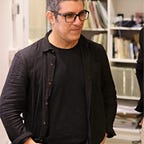The sound of hope
-080520230803–4m
Every day an old friend, an Air Force veteran like myself, sends me a link to songs from YouTube. He’s been doing this for five years.
We met at the School of Aeronautics Specialists, in Guaratinguetá, in the interior of the state of São Paulo, when we were twenty years old, in 1983, today we are sixty.
His gesture, in addition to being affectionate, is a kind of watch. Instead of pointers, we have blues, rock, pop, MPB from the 70’s and 80’s. Time of our adolescence and soon after the beginning of our professional life.
Of course, blues, rock, pop, MPB still exist in the 21st century. I admire the current music and artists that rock my children’s adolescence. I believe that my children, when they are old like me, will have great memories of teenage music. Not only memories of the songs themselves, but memories of the experiences lived during that period: studying, dreaming of supporting oneself, meeting friends.
It is very common to hear from older people the phrase “the music of my time was better”. Rarely do older people follow current artists and when they hear the music of today, they don’t feel any emotion comparable to what they still feel when they listen to the music of their adolescence and youth.
Obviously, the music of today is good for today’s youth just as the music of the past was good for the elderly and the music of the future will be good for those to come. It’s a simple equation: music = emotion.
What happens is that the elderly carry a great memory of the music they listened to from adolescence to the flowering of a profession. The equation of music and emotion, like our image in front of a mirror, is a temporal reflection. The music that a teenager listens to coincides with this unique moment in his life, which you and I have already experienced, as our parents have also experienced and their parents too. After all, nobody is a child forever, nobody is a teenager forever, nobody is elderly forever. However, adolescence is the unique moment to discover and choose the music you want to listen to. In adolescence, the psychological fabrication of freedom takes place.
As these are choices, this involves opening up to the world, exploring psychic boundaries, expanding mental territories, overcoming cultural barriers, seeking and exchanging information with people of the same age group immersed in the same unprecedented experience, that of leaving behind the childhood organized by adults and to organize their own adulthood in their heads.
Teenagers look for music that is different from what older people worship. Behind the scenes of the subconscious, it is the construction of identity. So, the teenager that each one was, is or will be needs to act psychologically in its favor. He needs to develop a kind of faith in himself, faith that he can overcome obstacles, that he is in fact different from his teacher at school, different from his parents, his grandparents, the traffic warden, the journalists, the adults stuck in their own beliefs.
The teenager finds an ally in music, a soundtrack for his psychological adventures so necessary to sow dreams. This unique moment, of being able to choose your own music to listen to in your room, on your headphones, in the basements of your mind, is a moment that lasts for a few years until the person recognizes himself in fact free from the repetitions of his elders, free to support yourself psychologically, and little by little in due time support yourself financially. In this magical, unique, critical period, there is a certain musical repertoire carrying the most different emotions in its wagons, towards the independence of body, mind and soul.
In the future, when they are old like their parents and grandparents, they can imagine the old phrase “the music of my time was better”.
It’s this way. We cling to this imperious illusion that the music of our time was better than the music of our children, grandchildren, of the current generation.
The fact is that the music of each adolescence is not psychologically consumed by the elderly. Our grandparents also criticized our parents’ music when they were teenagers. In short, when former teens become older (with rare exceptions) they will not psychologically consume the music of new teens.
Music = emotion.
But what song? Well, that of his adolescence and the flowering of his professional youth.
But what emotion? Well, that of experiencing freedom of mind, body, soul.
After all, it’s not about the musical quality, but the psychological effect of new experiences, the freedom to build secrets, self-determination, the sovereignty of dreams, planning, giving up, moving forward, taking risks, being afraid, insecurities, certainties, sadness , euphoria, doubts, courage, truths, lies, desires, needs, screams, silence, showing, hiding, getting it right, wanting autonomy and independence, all this with the sound of the soundtrack chosen by the adolescent.
Thanks to my friend Marcos César, an Air Force veteran, for sending me every day the songs we listened to in our adolescence and professional youth, songs that had just one unique and irreplaceable quality: it was the sound of our hope.
Farlley Derze
Pianist
Postdoctoral in Aesthetics, Semiotics and Hermeneutics
